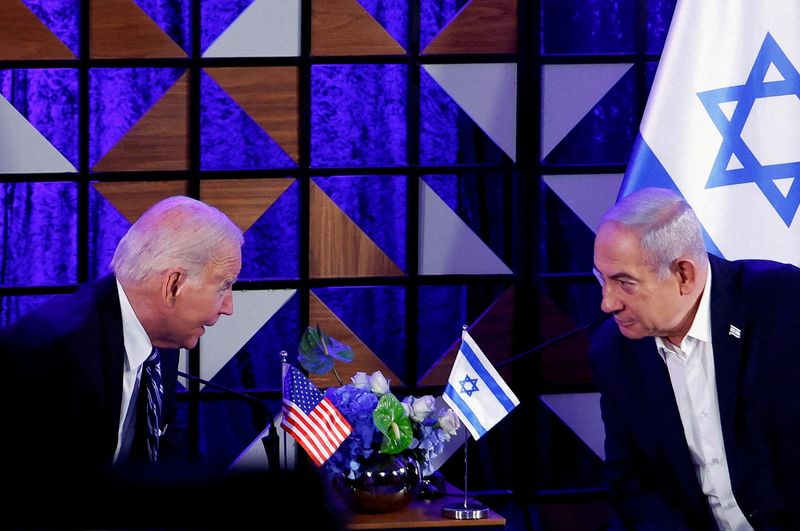By Andrea Shalal
WILMINGTON (Reuters) -U.S. President Joe Biden told Prime Minister Benjamin Netanyahu on Sunday that Israel should not launch a military operation in Rafah without a credible plan to ensure the safety of the roughly 1 million people sheltering there, the White House said.
Biden and Netanyahu spoke for about 45 minutes, days after the U.S. leader said Israel's military response in the Gaza Strip had been "over the top" and expressed grave concern over the rising civilian death toll in the Palestinian enclave.
The call focused largely on ongoing efforts to secure the release of the remaining 132 hostages held by the Islamist Hamas group in Gaza, a senior administration official told reporters, noting that "real progress" had been made in recent weeks.
While there were still some "significant" gaps to close, the official said the deal was "pretty much there," adding that Biden had stressed the need to capitalize on that progress to "secure the release of all hostages as soon as possible."
Biden also emphasized his view that "a military operation in Rafah just really cannot proceed without a credible and implementable plan for ensuring the safety of and support for the more than 1 million people that are now sheltering there," the official said, adding that they simply had "nowhere to go."
Biden's blunt warnings against a military operation in Rafah, located in the southern part of Gaza on the border with Egypt, come amid warnings from aid agencies who say such an assault could lead to many more death, and concerns that it could derail the hostage release efforts.
Hamas-run Aqsa Television on Sunday quoted a senior Hamas leader as saying that any Israeli ground offensive in Rafah will "blow up" the hostage-exchange negotiations.
Netanyahu's office has said that it had ordered the military to develop a plan to evacuate Rafah and destroy four Hamas battalions it says are deployed there.
"The president's been clear in his comments ... about Israel's conduct in Gaza," the official said. The United States supported the need to defeat Hamas, but had repeatedly warned Israel that it had to ensure that innocent civilians were protected.
Israeli leaders had told U.S. officials that moving civilians to safety was a "clear precondition" for their military operations, the official said. "They've made clear that they would not contemplate any operation without it."
Biden affirmed the United States' support for the long-term security of Israel, but also called for "urgent and specific steps" to increase humanitarian aid to Palestinian civilians in Gaza, including a huge shipment of U.S. flour that would feed 1.4 million Gazans for six months, the official added.
The White House said Biden and Netanyahu agreed to remain in close contact, but gave no date for a next possible call.
Biden will host Jordanian King Abdullah at the White House on Monday and has been closely engaged in the hostage release negotiations, the official said. U.S. officials are also in close touch with regional officials and Egypt.
'OVER THE TOP'
The Israeli prime minister told the "Fox News Sunday" program earlier on Sunday that he had not talked with Biden since the U.S. president's "over the top" comment and did not know what he meant by it.
The U.S. official said the comment was not addressed specifically in the call, the leaders' first since Dec. 19.
Asked in an interview with ABC's "This Week" program aired on Sunday how many Israeli hostages held in Gaza are still alive, Netanyahu said "enough to warrant the kind of efforts that we're doing."
Health authorities in Gaza, which is controlled by Hamas, estimate more than 28,000 Palestinians, mostly civilians, have been killed in the region since the conflict began in October.

Palestinian health authorities say around 70% of those who have been killed were women or children under 18. The World Health Organization has described the Palestinian Health Ministry system for reporting casualties as "very good" and U.N. agencies regularly cite its death toll figures.
Hamas gunmen killed 1,200 Israelis and took around 250 hostages back to Gaza in the October assault that triggered the conflict.